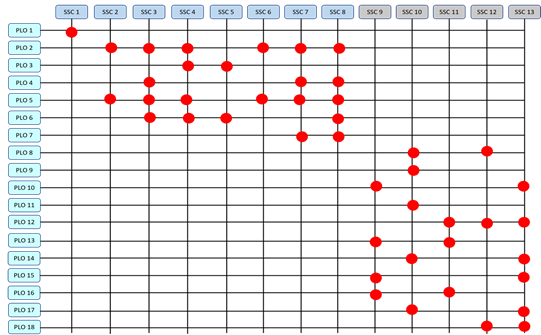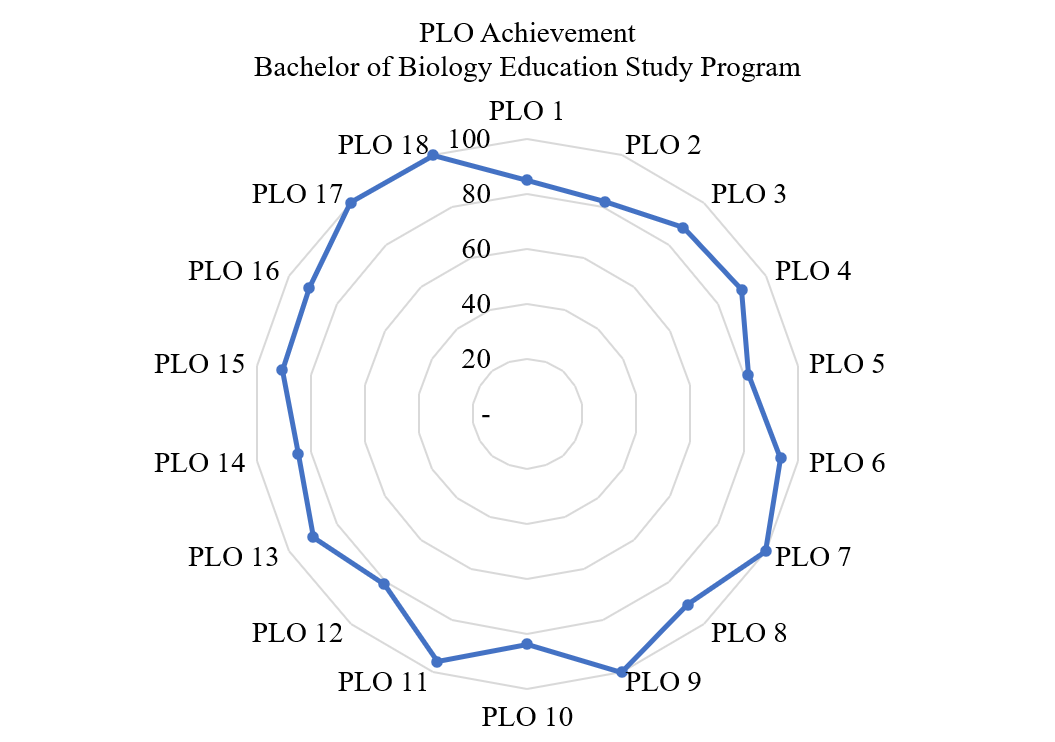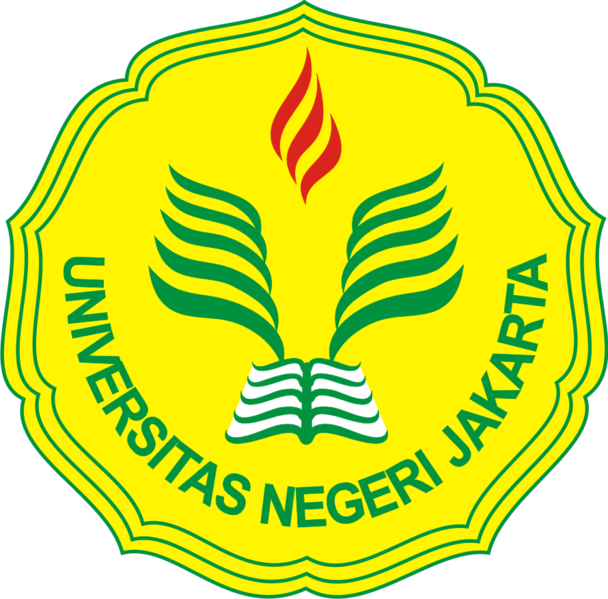Program Learning Outcomes (PLO)
Learning Outcomes of bachelor’s degree of Biology Education Study Program that is classified into two areas is presented in Table below.
| Area | Code | Program Learning Outcomes |
|
Specialist competences |
PLO 1 | Be able to understand the basic concepts of science (basic mathematics, physics, chemistry, and general biology). |
| PLO 2 | Be able to understand the concept of biology cell and molecular, development structure, biosystematics and evolution, physiology, genetic and biotechnology, ecology, environment and conservation. | |
| PLO 3 | Be able to implement strategic management, biology laboratory management, and field study in a unit of education. | |
| PLO 4 | Be able to understand the research procedures and research publication in biology education and the biology field of study. | |
| PLO 5 | Be able to solve problems and make decisions on the study of biology cell and molecular, development structure, biosystematics and evolution, physiology, genetic and biotechnology, ecology, environment and conservation through the implementation of relevant knowledge, method, and technology in multidisciplinary areas of study. | |
| PLO 6 | Be able to manage a biology learning laboratory on the basis of the classroom, field, and virtual laboratory. | |
| PLO 7 | Be able to conduct research and publish a research publication in biology education and the biology field of study. | |
| Social Competences | PLO 8 | Show religious attitude, good ethics, social awareness, responsibility, leadership. |
| PLO 9 | Be able to integrate values, norms, and academic ethics. | |
| PLO 10 | Show some thinking abilities which are conceptual, analytic, logic, critical, creative, and innovative to solve problems. | |
| PLO 11 | Have some abilities in social sensibility, ethics and caring attitude to the society. | |
| PLO 12 | Have some abilities in communication, literation, leadership, and self-development strategy. | |
| PLO 13 | Be able to understand and implement the philosophy of education in the Technological Pedagogical Content Knowledge (TPACK) learning base. | |
| PLO 14 | Be able to understand working ethics in the biology education field of study. | |
| PLO 15 | Be able to analyze and generate ideas for entrepreneurship programs in biology education and biology field of study. | |
| PLO 16 | Be able to implement biology teacher competencies with Technological Pedagogical Content Knowledge (TPACK) learning base. | |
| PLO 17 | Be able to implement working ethics in the biology education field of study. | |
| PLO 18 | Be able to design and implement a program of entrepreneurship based on biology education and biology field of study. |
The relevance between PLO and PEO of the Biology Education Study Program is described in the matrix below.

Figure 1. Matrix of Relationship between Program Learning Outcomes (PLO) and Program Educational Objective (PEO) of Biology Education Study Programme
The relevance of PLO and SSC of the Biology Education Study Program is presented in the matrix below.

Figure 2. Matrix of Relationship between Program Learning Outcomes (PLO) and Subject-Specific Criteria (SSC) of Biology Education Study Programme
PLO Achievement in Biology Education Study Program
| Area | Code | Program Learning Outcome (PLO) | Score |
| Subject-Specific Competences
|
PLO1 |
Be able to understand the basic concepts of science (basic mathematics, physics, chemistry, and general biology). |
84,89 |
| PLO 2 | Be able to understand the concept of biology cell and molecular, development structure, biosystematics and evolution, physiology, genetic and biotechnology, ecology, environment and conservation. | 81,96 | |
| PLO 3 | Be able to implement the strategic management, biology laboratory management, and field study in a unit of education.
|
88,16 | |
| PLO 4 | Be able to understand the research procedures and research publication in biology education and biology field of study. | 90,00 | |
| PLO 5 | Be able to solve problems and make decisions on the study of biology cell and molecular, development structure, biosystematics and evolution, physiology, genetic and biotechnology, ecology, environment and conservation through the implementation of relevant knowledge, method, and technology in multidisciplinary areas of study. | 81,56 | |
| PLO 6 | Be able to manage a biology learning laboratory on the basis of the classroom, field, and virtual laboratory. | 93,53 | |
| PLO 7 | Be able to conduct research and publish a research publication in biology education and the biology field of study. | 100,00 | |
| Specialist competences | PLO 8 | Show religious attitude, good ethics, social awareness, responsibility, and leadership. | 90,70 |
| PLO 9 | Be able to integrate values, norms, and academic ethics. | 100,00 | |
| PLO 10 | Show some thinking abilities which are conceptual, analytic, logical, critical, creative, and innovative to solve problems. | 83,79 | |
| PLO 11 | Have some abilities in social sensibility, ethics, and a caring attitude to the society. | 96,00 | |
| PLO 12 | Have some abilities in communication, literation, leadership, and self-development strategy. | 81,00 | |
| PLO 13 | Be able to understand and implement the philosophy of education in the Technological Pedagogical Content Knowledge(TPACK) learning base. | 90,00 | |
| PLO 14 | Be able to understand working ethics in the biology education field of study. | 84,71 | |
| PLO 15 | Be able to analyze and generate ideas for entrepreneurship programs in biology education and the biology field of study. | 90,57 | |
| PLO 16 | Be able to implement biology teacher competencies with Technological Pedagogical Content Knowledge(TPACK) learning base. | 91,59 | |
| PLO 17 | Be able to implement working ethics in the biology education field of study. | 100,00 | |
| PLO 18 | Be able to design and implement a program of entrepreneurship based on biology education and biology field of study. | 100,00 |


